From history’s battlefields to today’s battles against a pandemic, nurses have been on the frontlines, and your online masters in nursing education can help give you the things you need to assure the next generation of nurses continues this tradition of excellence.

Your studies will combine clinical and education-based courses to help prepare you to teach in academia or work in staff development in hospitals, clinics, other health care, nonprofits or businesses.
Editorial Listing ShortCode:
Recent nursing shortages have been exacerbated by a lack of qualified instructors. Your degree can help put you in high demand for this financially and personally rewarding career.
Universities Offering Online Master’s in Nursing Education Degree Programs
Methodology: The following school list is in alphabetical order. To be included, a college or university must be regionally accredited and offer degree programs online or in a hybrid format. In addition, the schools offer nursing education masters degrees online, with some also offering accelerated online nursing programs.
Angelo State University
Angelo State University’s Master of Science in Nursing program features a Nurse Educator concentration. The program is offered online through Blackboard, and the mandatory on-campus visits are rare.
There are clinical requirements, but those can be completed in students’ cities of residence. Courses include pharmacotherapeutics, pathophysiology, health policy, and ethics.
Angelo State University is accredited by the Southern Association of Colleges and Schools Commission on Colleges.
Arizona State University
Arizona State University offers an online Master of Science in Nursing – Nursing Education. The program requires 33 credits in the form of 12 courses, which are 7.5 weeks long. An applied project is required as a culminating experience. Graduates may be eligible to sit for the Certified Nurse Educator examination.
Arizona State University is accredited by the Higher Learning Commission.
Ball State University
There are three concentrations in Ball State University’s Master of Science in Nursing program: research core, nursing core, and educator core.
Students in the educator core concentration will take all general requirements and 19 additional credits in classes like pathophysiology and pharmacology, program evaluation, teaching in nursing, and curriculum design.
Ball State University is accredited by the Higher Learning Commission.
Benedictine University
Students in Benedictine University’s Master of Science in Nursing program can choose from the nurse educator or nurse executive leader tracks. Both are accredited by the CCNE, and there’s also a dual MSN and MBA degree option available to students who want a better understanding of the business side of nursing.
Benedictine University is accredited by the Higher Learning Commission.
Carlow University
Carlow University’s online, CCNE accredited Master of Science in Nursing program with a concentration in Nursing Education and Leadership helps students become knowledgeable educators, effective leaders, and catalysts for change within their organizations.
Carlow University offers the dual MSN and MBA program for students who want to improve their business acumen as well.
Carlow University is accredited by the Middle States Commission on Higher Education.
Concordia University – Irvine
Concordia University – Irvine’s Master of Science in Nursing program seeks to turn competent nurses into equally competent leaders and educators.
There are concentrations in both Nursing Leadership and Nursing Education, but both programs have the same core courses in their curricula. Additional courses are determined by the students’ chosen specializations.
Concordia University Irvine is accredited by the WASC Senior College and University Commission.
Drexel University
The Master of Nursing in Nursing Education program at Drexel University combines clinical and classroom techniques, theories for adult learning, critical thinking, and comprehensive coursework, all with the goal of helping nurses pass the new Certified Nursing Educator exam. A residency is required, but housing is provided for out-of-state students.
Drexel University is accredited by the Middle States Commission on Higher Education.
East Tennessee State University
East Tennessee State University’s Master of Science in Nursing program with a Nursing Education concentration is a 42 credit program that includes 12 core credits and 30 nursing education credits. Notable courses include life-long health assessment, women’s health and perinatal nursing, clinical prevention in mental health facilities, and pediatric nursing.
East Tennessee State University is accredited by the Southern Association of Colleges and Schools Commission on Colleges.
Excelsior College
Students enrolled in Excelsior College’s Master of Science in Nursing Education program can waive up to 16 credits and aren’t required to take the GRE for admittance. The program is designed for registered nurses who want to transition into teaching. The curriculum is robust, and there’s lots of hands-on experience.
Excelsior College is accredited by the Middle States Commission on Higher Education.
Fort Hays State University
Fort Hays State University offers a Masters in Nursing Education program that’s 100% online. The program is flexible and designed with working professionals in mind.
The classes are small, and students can receive personalized advising from the school’s department of nursing staff. Clinical experiences can be completed in students’ home cities.
FHSU is accredited by the Higher Learning Commission.
Franklin Pierce University
Franklin Pierce University’s Master of Science in Nursing program has leadership and education concentrations.
The education concentration is for students hoping to become nurse educators in either academic or health care delivery settings. It teaches them to utilize their knowledge of continuous quality improvement methodology to train competent future nurses.
Franklin Pierce University is accredited by the New England Commission of Higher Education.
Grand Canyon University
The Master of Science in Nursing program at Grand Canyon University features a Nursing Education concentration that’s both flexible and accredited.
The program features 6 main areas of focus, including disease prevention and health promotion, analytic foundations for practice, and leadership, policy, and advocacy. The school does not charge out-of-state tuition.
Grand Canyon University is accredited by the Higher Learning Commission.
Herzing University
Herzing University offers what it calls the accelerated RN to MSN in Nursing Education degree option. It’s a graduate program for registered nurses who want to earn masters degrees in nursing education. The program has CCNE accreditation, and the coursework is 100% online. There’s a hands-on clinical component that must be undertaken in person.
Herzing University is accredited by the Higher Learning Commission.
Indiana State University
Indiana State University’s Master of Science in Nursing program offers a Nursing Education concentration for students looking to move from practice to more scholarly pursuits. The program requires 37 credits to 40 credits, and all courses are offered online. There are no required campus visits, and clinical placements happen near students’ own homes.
Indiana State University is accredited by the Higher Learning Commission.
Indiana University Purdue University Indianapolis
Indiana University Purdue University Indianapolis (IUPUI) offers a Master of Science in Nursing program with a distance-accessible nurse educator track.
The curriculum is designed to teach students to utilize best practices in the field of nursing education, evaluate student learning, develop innovative teaching strategies, and design evidence-based nursing education curricula.
The IUPUI is accredited by the Higher Learning Commission of the North Central Association of Colleges and Schools.
Indiana Wesleyan University
Students in Indiana Wesleyan University’s Master of Nursing in Nursing Education program are prepared to become educators in a variety of settings, including universities, community colleges, and hospitals and clinics.
There’s also a leadership component to the curriculum that prepares nurses to take on more supervisory positions within their organizations.
Indiana Wesleyan University is accredited by the Higher Learning Commission of the North Central Association of Colleges and Schools.
Lamar University
The Master of Science in Nursing program at Lamar University offers a concentration in Nursing Education that can be completed in as few as 2 years. Students will be given core knowledge and teaching methods to prepare them for education careers. They will also learn strategies for designing innovative, effective curricula.
Lamar University is accredited by the Southern Association of Colleges and Schools Commission on Colleges.
Mercy College
The Master of Science in Nursing Education program at Mercy College is a 36 credit program that is fully accredited by the CCNE, AANP, and ANCC. The program can be undertaken by part-time or full-time students. The curriculum is designed to help students become transformative leaders in the various health care fields.
Mercy College is accredited by the Middle States Commission on Higher Education.
Missouri State University
Missouri State University’s Master of Science in Nursing program allows students to select a Nurse Educator concentration.
The program has CCNE accreditation, and all the online classes are taught by the same highly qualified, highly knowledgeable on-campus faculty professors. Graduates could potentially become nurse educators, nurse advisors, or community health educators.
Missouri State University is accredited by the Higher Learning Commission.
Nebraska Methodist College
Students in the Nurse Educator concentration of Nebraska Methodist College’s Master of Science in Nursing program can potentially graduate in less than 2 years. There are no GRE scores required, and the curriculum is designed for registered nurses who have a passion for educating others but need flexible school schedules.
Nebraska Methodist College is accredited by The Higher Learning Commission.
Sacred Heart University
Sacred Heart University’s Master of Science in Nursing program offers three different concentrations, including one in Nursing Education.
The nursing education track combines 12 general education credits with 9 specialization-specific courses in innovative curriculum development, theoretical foundations of nursing education, and other relevant nursing education topics for a well-rounded curriculum.
Sacred Heart University is accredited by the New England Commission of Higher Education.
Southern New Hampshire University
Southern New Hampshire University’s Master of Science in Nursing program with a Nurse Educator concentration features a curriculum that adheres to the standards set by the American Association of Colleges of Nursing and the National League for Nursing. Upon graduating, students should be prepared to pass the Certified Nurse Educator exam.
Southern New Hampshire University is accredited by the New England Commission of Higher Education.
Texas Woman’s University
Texas Woman’s University offers a nurse educator master’s program that teaches nurses to become teachers themselves. Students in the program can also apply for the school’s Nurse Educator Tuition Award, which may help them pay for their education expenses. Graduates should be prepared to teach at postsecondary institutions.
Texas Woman’s University is accredited by the Southern Association of Colleges and Schools Commission on Colleges.
University of Nevada – Las Vegas
University of Nevada – Las Vegas offers a Master of Science in Nursing degree that helps provide students with the skill sets, knowledge, and abilities necessary to become effective and efficient nurses and nurse educators. Of the three concentrations available, the nursing education track is the only one offered solely online.
The University of Nevada – Las Vegas is accredited by the Northwest Commission on Colleges and Universities.
University of Saint Mary
The nursing education master’s program at University of Saint Mary prepares nurses to become educators and equips students who plan to pursue nursing doctoral degrees.
Program participants should come to understand the legal and ethical issues surrounding nurse education and should learn to collaborate with others for cross-platform education opportunities.
The University of Saint Mary is accredited by the Higher Learning Commission of the North Central Association of Colleges and Secondary Schools.
University of Texas – Arlington
University of Texas at Arlington’s Master of Science in Nursing program features a concentration in Nursing Education that’s CCNE accredited and can be completed in less than 2 years. Some of the most common core courses include pediatric assessment, role of the nurse educator, and advanced health assessment and diagnostic reasoning.
The University of Texas at Arlington is accredited by the Southern Association of Colleges and Schools Commission on Colleges.
University of Texas – Tyler
Students at University of Texas at Tyler can pursue a Master of Science in Nursing with a concentration in Nursing Education. The program can be undertaken either full-time or part-time. It’s been ranked as one of the top online nursing programs in the nation by U.S. News & World Report.
The University of Texas at Tyler is accredited by the Commission on Colleges of the Southern Association of Colleges and Schools.
University of Wyoming
University of Wyoming’s nursing masters program is a part-time program with two concentration options: nurse educator and nurse leader.
The program is designed for nurses looking to advance or transition into new fields. Central to the curriculum are classes on rural population health, interconnected global perspective, outcomes orientation, and communication.
The University of Wyoming is accredited by the Higher Learning Commission.
Walden University
Walden University is named by College Factual as one of the top choices for nursing programs. The school offers various money-saving options to help cut down on the cost of tuition, and the program’s Tempo Competency-Based Learning option allows students to work entirely at their own paces.
Walden is accredited by The Higher Learning Commission.
Western Governors University
Students enrolled in the Master of Science in Nursing Education program at Western Governors University can earn their degrees in as few as 2 years. The program aims to prepare students to become nurse educators who work with and train nursing students, other nurses, community groups, patients, and even school children.
Western Governors University is accredited by the Northwest Commission on Colleges and Universities.
Online Masters in Nursing Education Programs
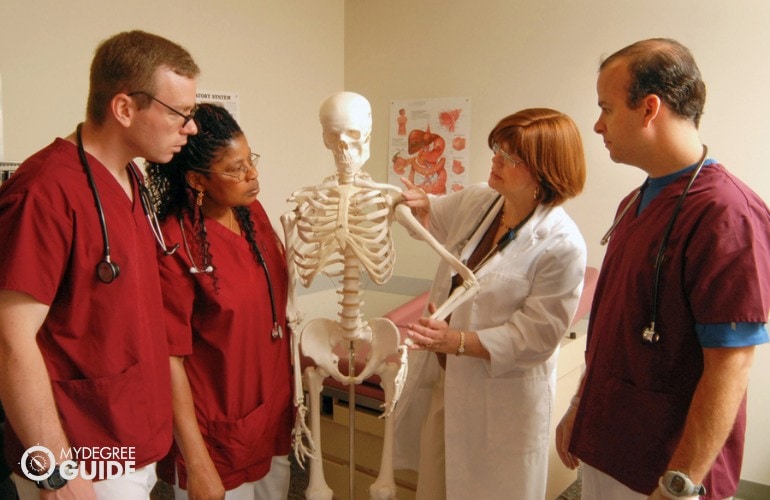
If you are a registered nurse wishing to start a new and fulfilling position, look no farther than the position of nurse educator. This degree may lead to a teaching position at a university or to employment in a wide variety of clinical settings where you can train staff and become a leader.
As a nurse educator in a college RN program, you can help new nursing students learn the foundations that will allow them to confidently advance from basic science courses such as anatomy, physiology, and microbiology, to more clinical classes such as acute care, newborn, or surgical nursing.
In this teaching position, you can be a role model. You can transfer the knowledge you have to student nurses who can benefit from your experience. You can work to evaluate and improve curriculum to assure that your students are learning the most up-to-date, research-based skills and practices.
You may also help freshmen adjust to the demands of undergraduate nursing education. Transition from high school or another field of employment may be difficult and you can help pave the way to success by teaching your charges to set goals, manage their time, deal with stress, and join a team.
In clinical, hospital or other settings, you may work with all levels of personnel to assess current practices and update the knowledge and skills needed to meet today’s challenges. You may work with many different population groups, such as those needing emergency care or the growing senior sector.
Nursing education online classes are designed to teach students how to teach. You should receive instruction in such areas as strategies for quality nurse education, curriculum planning and evaluation, educational psychology, instructional design, teaching with technology, and instructing for diverse learning styles.
You may also study clinical applications in areas with which all nurses must be familiar. These may include pharmacology, pathophysiology, disease management. Most degrees also require field experiences, practicums and capstone courses.
Online Masters in Nursing Education will likely include classes in such diverse subjects as health trends, health policy, statistics, holistic practices, research, assessment and ethics as well.
Nursing Education Careers & Salaries
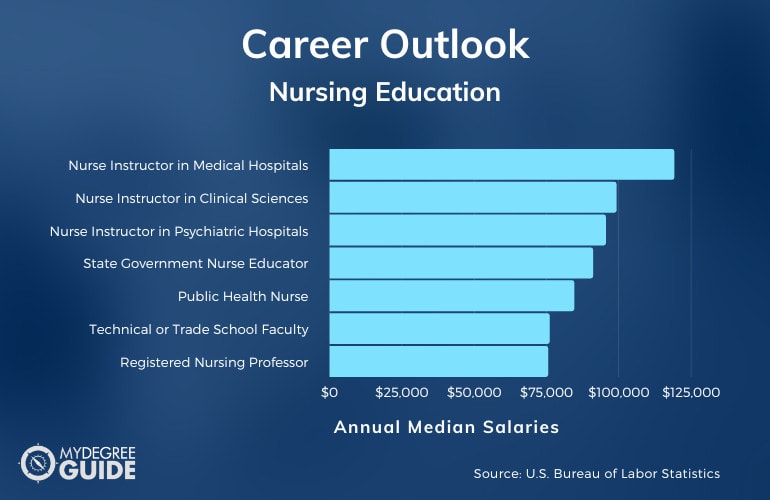
A nursing educator may work in many settings. Potential jobs fall into a number of categories including college or university teaching, staff development in hospitals or other clinical settings, or nurse educators in government or the private sector, working with non-profits, government or businesses.
The Bureau of Labor Statistics reports the following average salaries for an MSN in nursing education.
| Careers | Annual Median Salary |
| Nurse Instructor in Medical or Surgical Hospitals | $119,050 |
| Nurse Instructor in Clinical Sciences | $99,090 |
| Nurse Instructor in Psychiatric or Substance Abuse Hospitals | $95,430 |
| State Government Nurse Educator | $90,990 |
| Public Health Nurse | $84,490 |
| Technical or Trade School Faculty | $75,990 |
| Registered Nursing Professor | $75,470 |
| Junior College Faculty | $75,190 |
| Community Health Educator | $56,500 |
| Nursing Informatics Specialist | $51,840 |
Salaries will vary widely, depending on location, your education, and your job experience. In addition to teaching and working in hospitals or clinical settings, technology is opening new career possibilities, including nursing informatics specialists who integrate data and information to better support patients.
Nurse educators can work online for hospitals, nonprofits or pharmaceutical companies to answer questions directly from patients or health care personnel. They can also work with many government entities, such as fire departments, to assure first-class delivery of their job-related health care.
Salaries for hospital nurses also vary widely, depending on the type of hospital and the details of the particular job. Specialty hospitals, such as those dealing with substance abuse or geriatric medicine may pay differently than teaching hospitals or those who offer general medical or surgical services.
In addition, many health organizations, such as those dealing with chronic conditions, employ nurse educators to help patients and families understand and cope with their diseases. And government agencies may hire you to work with or research quality control, policies or education needs.
Salaries typically rise when more experience is gained in a particular area and with movement into positions of increased responsibility. As a general rule, those with a masters usually begin their new careers with salaries that exceed those of registered nurses by about $12,000 and increase from there.
Choosing a Nursing Education Degree

Many universities understand the need to offer online degrees that provide the flexibility needed by today’s nursing educators. Since there are many choices, consider making a chart that allows you to compare the criteria you value among the universities. Here are some factors:
- Length of program: Degree requirements range from approximately 22 to 46 units.
- Tuition cost: This will depend on factors such as whether the university is public or private and whether you will have to pay in-state or out-of-state tuition.
- Classes: Read course catalogues or descriptions carefully to make sure class offerings include the subjects you most want to study and lead to the licenses and certificates that will be required at the location where you want to work.
- Accreditation: It is very important to select a regionally accredited university.
- On-campus attendance: Many programs will require practicums or clinical experiences, so investigate whether and how many credit hours you will need to attend in person.
- Financial Aid: Because a critical shortage of nursing exists, there are some unique financial aid and loan programs available to nursing educators that the Financial Aid offices at universities you are considering may help you to identify and apply for.
Additional criteria may be added depending on what you learn during your comparison research and what is important to you.
Nursing Education Curriculum & Courses
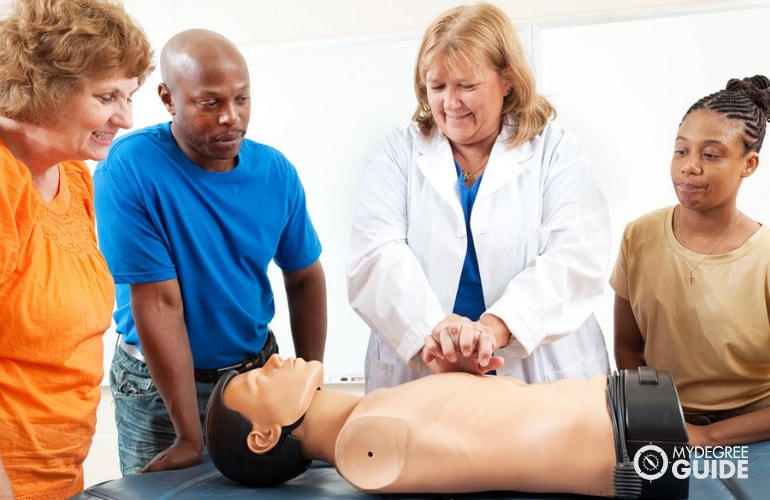
A Masters in Nursing Education combines education courses with clinical ones. The following list describes some of the classes that you may take during your program.
- Student-Centered Learning: This course can help you transform student experiences into innovative courses that teach them to inquire, collaborate and learn.
- Curriculum Design: Teaches how to create and deliver curriculum based on accrediting standards that recognizes the need to address nursing practices in our diverse world.
- Healthcare Policies, Politics, Cost and Organization: Provides an overview of the legal, ethical, gender, and generational issues that face health care today.
- Nursing Leadership: Providing high-quality health care requires understanding of the relationships within health care systems and how to collaborate, resolve conflict between them.
- Informatics of Nursing: New technology, data storage and information systems enhance patient care. This course can help you learn how to design, implement and evaluate today’s electronic systems.
- Physiology, Pathophysiology and Pharmacology: This course can help you guide your nursing students to interpret changes in symptoms and functions related to illness and medications.
- Research Design: Nurse educators need to learn and understand qualitative and quantitative research and be able to evaluate recent nursing research findings.
- Nursing Theory: Like all academic disciplines, nursing is based on a variety of theoretical foundations that students should understand in order to be effective practitioners.
- Measurement and Statistics: This course focuses on how to give students a foundation for understanding statistics and the relationships between variables in nursing.
- Seminars: Several advanced courses can teach you how to deliver educational material to maximize learning and develop critical thinking skills that go from classroom to the real-world.
Each university develops its own requirements, and you should study the similarities and differences to make sure the universities you are considering offer curriculum you want to take.
Admissions Requirements
This is a Master of Nursing in Nursing Education program so admission will be limited to those who have completed undergraduate nursing degrees.
Admission criteria differ among institutions, but typical requirements include:
- A bachelor of science in nursing degree and transcripts from undergraduate institutions (certain grade point averages (GPA) and listed courses may be required).
- A current, unencumbered registered nursing license.
- A resume which demonstrates current employment at application time
- A criminal background check
- Several letters of recommendation
- A personal essay that might include information such as your background, information about why you want to pursue this degree, your plans for balancing your job and your studies, and your future career goals.
Many applications can now be completed online, but be sure to read all requirements carefully and pay close attention to deadlines. You do not want a missing piece to hinder your acceptance chances.
Accreditation
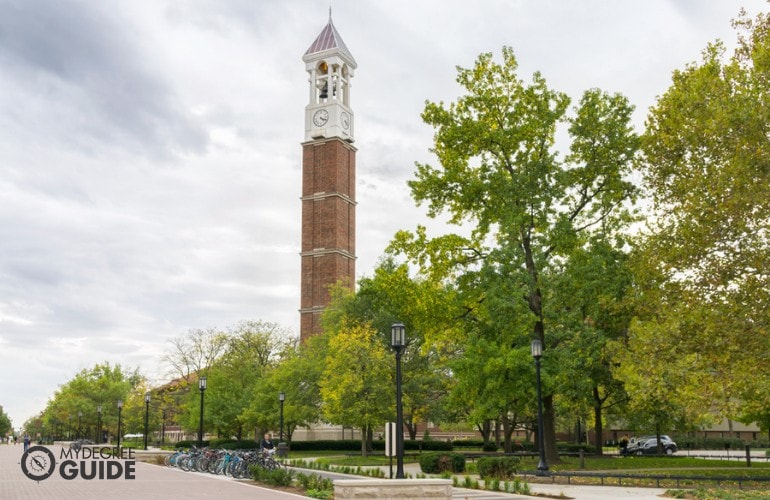
In you search for online Masters in Nursing Education Online Programs, one of the most important criteria to look for is accreditation. The Council for Higher Education Accreditation (CHEA) lists all organizations that meet its standards for high academic quality and continual program improvement.
CHEA has an easy to use “search” function that allows you to enter the name of a university you are considering and find out whether it has been accredited. In addition, the Commission on Collegiate Nursing Education (CCNE) is a useful resource for locating accredited graduate nursing programs.
Financial Aid and Scholarships

The first place to start your search for funds that can help you pay for your education is the Federal Student Aid Office. Their website is easy to use and can help you navigate to all the pages and forms you need to begin the application process.
The financial aid office at each university you are considering is a great place to begin your search for funds that can help you pay for your education. In addition, because of the nursing shortage our country is currently experiencing, several private, government and military organizations offer funding to qualified applicants.
Check out the Nurses Educational Funds Organization for information about funding for nurses who wish to advance their education. Other public or private donors may also provide scholarships or other income sources to help nursing education students with tuition and related expenses.
What Can I Do with an MSN in Nursing Education?

An MSN in Nursing Education can allow you to teach students and help people in need of reliable medical information in an ever-growing number of settings. Nurse educators with master’s degrees are in scarce supply and many opportunities are available to those who seek new challenges.
With an MSN, you can teach and mentor undergraduate student nurses and really make a difference in their lives. Most hospitals and clinical settings need nurse educators for staff development. And a growing number of businesses and nonprofits need nurse educators to provide continuing education. Remember this is a versatile degree. Possibilities abound.
How Much Does a Nursing Education Master’s Cost?
Tuition will vary from university to university depending on whether it is pubic or private, if you live in state or out of state, how many units you are taking, and whether you are on semester or quarter systems. The total amount will also depend on the number of units required for graduation.
Cost per credit hour ranges from approximately $450 to $600. To estimate your tuition, simply multiply the cost per credit by the number of credits required for graduation and add fees.
How Long Does It Take to Get a Masters in Nursing Education Online?
Your length of time to degree completion will depend on a number of factors, primarily the total number of credits required for graduation and if you are attending full-time or part-time. If you take 12 units per semester and the degree requires 36 units, you can finish in just three semesters.
Many master’s students attend part-time, taking about 6 units per semester. If you follow this common path and your university requires 36 units, it will take you six semesters to graduate.
What Can You Do with a Masters in Nursing Education?
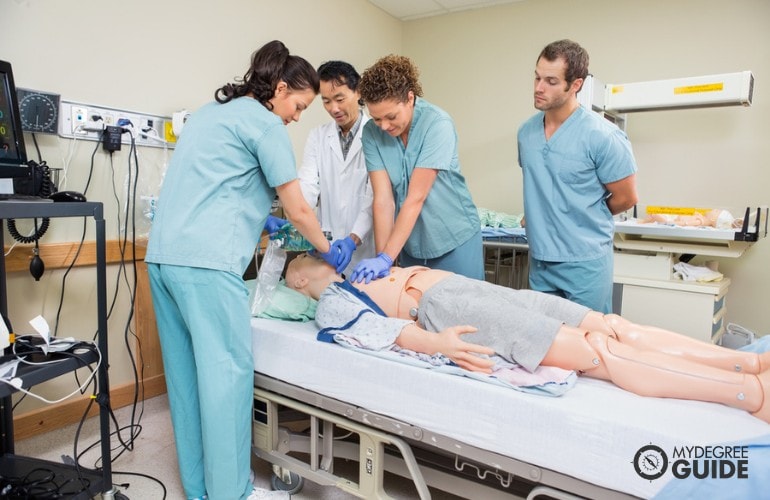
A Master’s in Nursing Education is in demand in the workforce according to the Bureau of Labor Statistics. Your online degree can enable you to teach nursing students or current medical employees in clinics, hospitals, and a variety of businesses or nonprofits that employ medical personnel.
Increasingly, nursing educators are needed as university faculty or to assume leadership positions in academia or other sites with medical responsibilities. You can work in staff development in government, nonprofits, businesses, or directly with patients and their families to help them understand their health profiles and make wise decisions.
Is a Master’s in Nursing Education Worth It?

Yes, a Master’s in Nursing Education is worth it for many students. In the healthcare field, jobs are projected to grow at a rate of 15% in the next 10 years (Bureau of Labor Statistics), way much faster than the overall average growth. Common careers in this field include teaching or leadership roles in universities, clinical settings, or other corporate, government or nonprofit organizations that have employees, patients or other populations that need continuing education.
The field can lead to many lucrative and personally satisfying careers in multiple settings, with some even choosing to pursue their doctorate in nursing education. Nursing educators are needed, respected, and rewarded.
Getting You Master’s in Nursing Education Online

If you are a registered nurse who is looking for a new, personally satisfying, and well-paying career, consider an Online Master’s in Nursing Education. Universities have created degree paths that recognize the demands on your time and allow you to take classes that fit around your busy life, from accelerated bachelor’s to PhD nursing programs online.
The nursing shortage in our country has opened many new opportunities for those with an MSN degree. You can teach nursing students, provide continuing education employees in hospitals, clinics, nonprofits or corporations, conduct research in your field of interest, or combine any of these into a new career.
Current events have given this degree tremendous versatility. More people are insured than ever before; the population is aging, and new medical facilities and systems all need nurse educators. For the rare career that combines financial awards with personal ones, nursing education may be for you.
